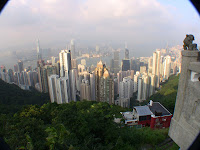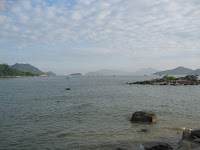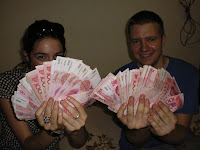 |
| temple on Qixishan |
So it's been quite a while now. It's steadily getting colder, the fall is coming and with it the typical autumn in the personal phases that characterize such one-year-trips. With alle the on-going debates about integration in Germany, one unevitably reflects the own situation. Even though last Sunday I went to a German restaurant to eat a „Schnitzel“ and watch „Tatort“ (usually considered the complete failure of integration for a German in a foreign country, if done regularly), I think it's not quite as bad. In daily life (shopping, eating, taking a cab, ...) I usually don't encounter any major problems, but still I notice something is missing. In retrospect I'm not sure if I really should have chosen Nanjing. From reports of others, the density of foreigners and people who speak English here seems to be even worse than in Bejing and Shanghai. The general problem of exchange programs for students is that there are very few occasions to get mixed with Chinese. Nanjing is a nice city and on one side it would be sad not to be here, on the other hand I feel like I would have a much better chance to get to know China if I were to be somewhere far out in the middle of nowhere. In order to overcome that I considered volunteer work as an idea, but it turned out to be very hard to offer work for free. Apparently Chinese are so hospitable, that they feel to have the obligation to care so much for you, that having a volunteer is much more work than not having one. Quite honestly, I'm getting quite frustrated with that situation, because right now (in comparison to my other trips to other countries) I don't even see the prospect of ever having an impression after one year of what being a Chinese could mean.
 |
| autumn |
Looking at other students from my program, I have noticed that it makes a huge difference living together with Chinese. Getting money for being here, makes me feel obligated to make this year a success and i know that I'm being impatient, but this is just a part of the autumn-phase. :-)
Besides that not a lot happened since my last entry. We already took our mid-term exams and finished our first book. Some people dropped by to have us answer for the Chinese census (luckily only 7 questions for foreigners and not 20 or 40 like for Chinese) and I took an 二胡(èrhú) class. It's a traditional Chinese instrument, similar to the cello, but the sound is very Chinese. I also booked my tickets for my trip back for Christmas.
Actually now is a good place to tell a small Christmas story: One night we came back from eating at a restaurant. Walking over one of the biggest crossings in Nanjing we came to notice a strange light on the blue nightsky. It was moving, colourful, blinking and we definitely had no inkling of what it might be. Obviously the first idea: an UFO. But then it struck me and I came to realize: we are three wise men from different parts of the world, in the East, carrying some presents on us (money, a bottle of water, …) ... this must be a sign. So the three „wise“ men decided to follow the star even though it was actually already quite cold outside and they were a little eager to get back home fairly quickly. Luckily we didn't have to walk too far, just up a small hill to the wutaishan sports center. Having a little expected to find a stable, we had to realize that an old man was playing with an kite wired to some bulbs. Having solved this riddle and already on our way back we overheard a couple of small children who were also following the weird light in the sky. Obviously we didn't tell them what it was...
 |
small group photo on the mountain
the four on the right
are in the same program |
One actually gets to see kites, fans, fireworks or umbrellas more often here than one would generally in Europe. On the other hand they are usually not as spectacular as one might expect.
Another great experience I had was getting my hair cut. Since wages are really low and therefore it is not really worth testing one of the smaller hair cutting places, that sometimes offer services I'm not really interested in, I went to a big shop on one of the biggest streets. For approximately 3 euros, about 4 or 5 people were involved my hair cut, the most outstanding being the so called „master“ who first threw some sort of cowboy belt filled with all imaginable hair utensils around his body, and then with big gestures and his own hair flying around me started cutting every single hair on my head by itself. At least that was what it looked like and how long it took. Actually, in every small shop there are about three or four accountants, everyday somebody is sweeping all the streets and in malls there is always somebody whose sole job is putting a stamp on the receipts of the customers. Comparing that to the prices and the numbers of customers, one can get a feeling how little those people earn in comparison. That is probably also why there is often put a lot of effort into seemingly small wishes. The service is in regard to what is actually done for the customers really amazing, but in regard to the very rough tone sometimes unbearable. It's the same with people shouting 服务员(fúwùyuán) „waitor“ through the whole restaurant, or that if you dind't know better you would start thinking your name was 喂 (wèi) „hey“ or something like that, with all the bikes shouting at you to get out of their way or people yelling angrily about the smallest things to strangers. In contrast to that, once you only mention a small problem on the side to somebody you just know a little bit, they start worrying about it much more than you ever would and spend a lot of time trying to help. So much that you don't want to mention problems anymore, because you don't want to be the reason for so many troubles.
 |
| Kunju |
One weekend ago we went to the
栖霞山(qī xiá shān) „Mount Qixia“ in Nanjing, which is supposed to be really beautiful and colourful in the autumn. In Nanjing City itself the fall is not really noticeable, the leaves just seem to fall down green or just slightly brown. We went in a mixed group of Germans and Chinese students of German law. During the cab ride I learned that there is about 10000 taxis in Nanjing and that might also be about the amount of steps that we took on that mountain. From the top I got my first small glimpse of the
长江 (chángjiāng) „Yangtse 'long river'“. It was still pretty green, but some of the leaves already showed some color. On the foot of the mountain we got to see a small buddhist temple. After all it was really, really nice to get outside of the city and get to see a bit more than just high-rises.
We also got to see a kunju-piece from which the jingju (Beijing Opera) evolved. Nanjing is one of the few cities in which one can go see such performances on a regular basis. The high pitch they are singing in is actually not causing as big a headache as I would have imagined earlier^^

























